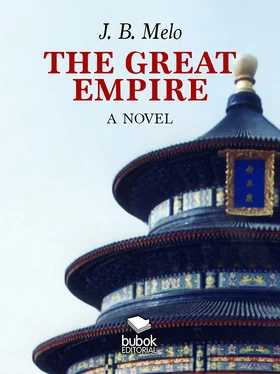With the entry of another girl named Xi, came the friction, intrigue and other poisons. She had a great capacity to awaken minor feelings among the others (where and whenever she appeared, Xi put everything in a state of siege) - when she passed by, touched or mentioned, she always had a few drops of poison to leave behind. It would be said that this behavior was a total contrast to her sweet face. Xi very early on proved to be ambitious, manipulative, cunning and cruel. In just two years, she destroyed Empress Zizi and ascended to the supreme authority of chief wife. Xi’s childhood had been very difficult. Her parents, austere and cold, possessed great calculating skills in everything they did, particularly in human relationships. Her father, an old general, had climbed the hierarchy at the expense of a sheath and sword, which he always used when necessary to clear the way and thus pass to the next step. Xi’s mother, a wasp, who did not mind sticking her sting whenever she found material or social advantage in it. In this “healthy” environment, it is natural that Xi, our rose, was used to a breathable air of carbonic anhydride. The poison therefore run in her veins as naturally as oxygen run in anyone else’s.
In the palace the life of the girls and the concubines was admirable, doing everything to attract the good graces of the Emperor. For Li and Xi it represented an art. They had, however, a different way of doing it. Li brought a fragrant and refreshing atmosphere, yet developed feelings of envy in the group. The Emperor, with Li’s arrival, began to prefer this one more often, to the detriment of all the others, creating an unpleasant climate of almost rejection among the others. Li seduced, seeking to win the Emperor’s heart through good moments, beauty, personal charms and naturalness. Later, with the arrival of Xi, the social life among the concubines became more agitated, because at certain moments the air was unbreathable, there was so much tension one could cut it with a knife. Xi awakened the fascination through perfumes, provocative nudity, flattery and much, much intrigue to the mixture, loaded with tricks and seduction. With these two, the other girls thus appeared to the eyes of the Emperor like a flower bed, who from time to time lent variety to his garden, without however attracting his particular attention. Almost all of them sighed, with some longing, for the times before the coming of Li and Xi, particularly the latter, to whom they gave the nickname of snake. In the good old days palace life was more monotonous, but always preferable to the present day, laden with intrigue and poisons. The later arrival of Xi to the group had a favorable initial reception, since the Emperor’s preference began to alternate, which did not fail to please the ego of the other concubines who had feelings of envy for Li. However, it was a short-lived sun, and Xi made it very clear very early on that she was the one who marked the territory there, and would not allow anyone to disturb her path.
In the palace, everyday life, outside the intrigues of the corridors, took place in the secularity of time. The Emperor’s residence was a place of magnificence; both for the luxury of its buildings and for the sweet life lived in its rooms. More than two thousand workers worked in its construction and for more than a decade. Altogether, the palace represented a space of more than seven hundred thousand square meters, distributed over more than nine thousand rooms. It was not restricted to a single building, but rather to a vast cluster of others, separated by monumental enclosures and fortifications. It was fitted with parks and imperial temples. The doors and atria of the buildings were oriented from south to north, thus reaping the blessings and favorable looks of the gods. The sumptuous and vast buildings, mostly built in marble, were given names of significance. The Supreme Harmony was the site of the imperial throne which, together with two others, created a grand setting. A complex of three avenues formed the South/North axis of access, the central one being reserved exclusively for the Emperor. The residential wing was initiated by the palace of Earthly Tranquility followed by that of Celestial Purity, Tranquility Longevity, Increased Elegance, Food of the Spirit and many others. Around the palace, better said the imperial city, there was another one where the administrative services of the State and the people were located. In the administrations of the State, the Servants were recruited among the most literate of the empire, both for political and religious service. In the latter a great moral improvement was required, where goodness, justice, respect for rituals, wisdom and trust were determining factors. The Imperial House, which administered the Emperor’s goods, palaces and other sources of income, constituted a separate structure. The people, that myriad of faceless souls and future, at the time represented only the guarantor and support of the existence of their Emperor. The two cities were separated by high walls for the necessary protection of the royal family. If during the day the imperial city was full of life, at night the Emperor was the only man within the walls, with his wives, concubines and eunuchs 2.
For the Emperor his immediate family was not limited to the Empress and her children, but extended to his concubines and their descendants. In the palace complex twelve buildings were dedicated to the Emperor’s family, six to the west and six to the east, followed by a vastness of other minor ones where young children and their caretakers were housed. The Empress, the main wife, had a special status and enjoyed great prestige, while the secondary wives and concubines had minor rights. The imperial family therefore had its own hierarchy, with the use of high rights and proportional servants. The Emperor thus had a gynaeceum, formed by women from all provinces and strongly hierarchical, which had eight categories: the Empress, as the main wife; the secondary wives; the superior concubines and the simple ones; the court ladies; the ladies-in-waiting and finally two categories of maids: the officers and apprentices. The concubines, according to their hierarchy, lived surrounded by court ladies and eunuchs, many of them devoted part of their time to embroidery and silk weaving. In their annual recruitment, the girls, over three thousand, were chosen from among the provincial beauties and were aged between thirteen and sixteen. When the Emperor elected a new secondary wife from among the girls and the concubines, wedding ceremonies were held, replicas of those held with the Empress, but with less magnificence. These events, however, represented a tiny part of his occupations.
In daily life the Emperor had an intense life - he would get up very early, at three o’clock in the morning, followed by religious rituals. At six he took his first meal, after which he occupied himself with empire business. At noon he had a second meal, where a large number of dishes were served of which he would eat only a minimal part. A period of rest followed. In the afternoon he was devoted to official hearings and reading reports. In the late afternoon he would have an informal supper followed by erudite and other activities.
In the summer, the Emperor moved with part of his court to a second imperial residence built for this purpose. Taking advantage of the riverbed, at the foot of a mountain, a lake was built there and, on its banks, several palaces were built which, together, formed the imperial summer complex, which due to its landscape, layout of the buildings and natural beauty, allowed a unique closeness between people. Outside the daily pressure of commitments and protocols that the Emperor was subject to in the imperial city, here he was able to devote a little more attention to those closest to him. The wives and concubines knew this, so in these periods the relations between them were always boiling and the attention given to the Emperor was redoubled. In the past, some marriages performed promoted moments of proximity precisely in the summer complex. It was also here that everything had begun for Li and Xi. The serenity of the lake, in contrast to the green slope, gave the girls, especially those recently incorporated in the service of the palace, a pleasant feeling of happiness. The beauty of the landscape, adorned here and there by the palace buildings, led them to think that the best in the world was there at their feet. They dreamed that one day they too would have the supreme happiness of being married to the Emperor. Those sweet initial moments, however, hid the arduous climb to that mountain of dreamed happiness. The winding roads, traps and lethal poisons, built by the other competitors, quickly shattered the dream of the inexperienced.
Читать дальше












